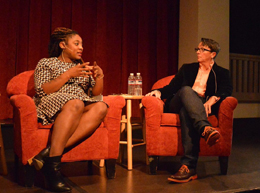Earlier this month, I had the privilege of speaking at a Women’s Funding Alliance Town Hall event alongside Alicia Garza, a co-founder of the #BlackLivesMatter network. The topic: what bold and inclusive feminist leadership means and looks like today.
While preparing my remarks for the event, I reflected on what leadership looks like for me at this particular moment, as the Executive Director of a community foundation. I found myself thinking back on when my community activism began during the initial years of the AIDS crisis—another time when we were fighting for our lives.
As a lesbian, AIDS did not pose the same personal threat to me on the surface as it did to the gay men around me. But it didn’t mean I wasn’t profoundly impacted. And it didn’t mean I wasn’t responsible for showing up.
The moment we are in today is connected, though certainly different in important ways. Back then, we were responding to a disease that was killing people by the thousands. What began as an effort to simply take care of those that were dying around us, turned into something greater—the need to dismantle the discriminatory systems that were costing people their lives.
And so today, we find ourselves in a similar time. More and more, we are hearing the names of young black men and women who have been killed by law enforcement, and we are seeing the faces of transgender women of color that have been murdered. We are facing an epidemic of a different kind—and the loss of life is just as real.
This violence is systemic; it goes deeper than acts against individuals. Just as we did in the midst of the AIDS crisis, we must refocus our efforts toward changing the policies, institutions, and culture that deem some of our lives more worthy than others.
Today at Pride Foundation, we recognize that unless we lead with the stories of those most impacted—transgender women of color, young black men, immigrants, queer youth—we are losing a critical opportunity. Not only to give agency to those that have historically and categorically been denied access, but also to create a broader movement for equality that truly lifts up all of us.
However, the fact remains that there’s no blueprint for how to lead in these times.
Positioning our work at the intersection of race, gender, sexual orientation, and class is complex, difficult, and sometimes contentious. Talking about these things is hard, and we are still developing a common language and framework to understand how people’s identities shape their experiences and the fabric of our communities.
But peoples’ lives are at stake. And we can’t let this process, or our own discomfort, prevent us from moving forward.
In my remarks at the Town Hall, I emphasized that leaders, white leaders like myself especially, have to get used to sitting in a space of discomfort, even great discomfort, because this is where learning and growth happens. We need to be willing to take a long, hard look at ourselves to understand how privilege operates in our lives and in the world.
Like during the AIDS movement, leadership at a moment like this means challenging our assumptions and transforming our vision of what this world can look like.
Fundamentally, Pride Foundation’s work is to ensure that the humanity and potential in each of us has space to flourish—that people have the freedom to imagine endless possibilities in their lives.
And that is not a reality for too many in our community.
- Just this year, 21 trans women have been reported murdered in the United States, most of them were women of color.
- LGBTQ people of color in same-sex relationships are significantly more likely to live in poverty than white same-sex couples.
- Among gay and bisexual men in 2013 in the United States, African Americans accounted for the largest estimated number and percentage of diagnoses of HIV infection.
- LGBTQ youth represent between 30% and 40% of youth served by homeless shelters, drop-in centers, street outreach programs, and housing programs, and a disproportionate number are youth of color.
In recognition of these facts and the harsh reality that so many in our community continue to face, Pride Foundation understands that to achieve true equality we have to intentionally apply our social justice philanthropy framework to the issues that are affecting our community and field. We are actively working to address the disparities faced by people of color and LGBTQ people of color in particular—both internally within our organization, as well as externally through our programs and partnerships.
This is what it comes back to: whether and how we show up for our shared humanity will determine our collective fate.
Our daily challenge is to be aware of how we show up in the world, and engage with every person around us. We all have to be willing to be open-hearted and vulnerable. And I can assure you, it won’t be easy. But I also know that the end result—full equality and dignity for every single member of our community—is worth the risk.
Kris is Pride Foundation’s Executive Director. Email Kris.
Read the rest of the articles in the October eNews:
